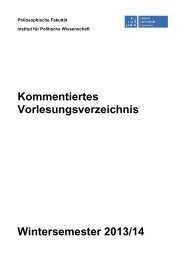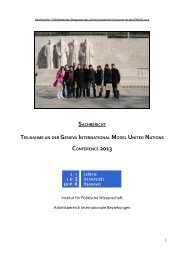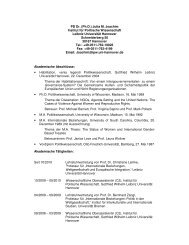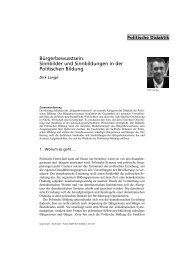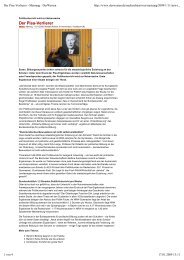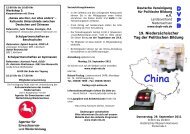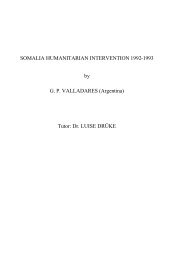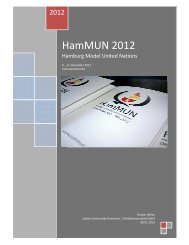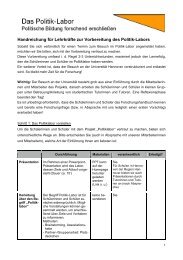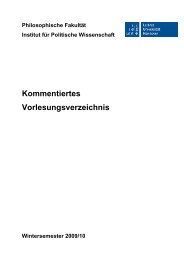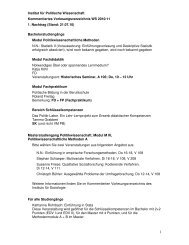Preventive Action for Refugee Producing Situations
Preventive Action for Refugee Producing Situations
Preventive Action for Refugee Producing Situations
Create successful ePaper yourself
Turn your PDF publications into a flip-book with our unique Google optimized e-Paper software.
178 Chapter 4<br />
Secondly, the United Nations is required in an increasing number of<br />
emergencies to negotiate not only access.but also arrangements to ensure<br />
the safety of personnel and relief supplies. The situations in Somalia, the<br />
<strong>for</strong>mer Yugoslavia and Iraq are tragic reminders of this dilemma.<br />
Thirdly, the serious problem of land mines, millions of which remain<br />
scattered in current and <strong>for</strong>mer combat zones, must be urgently addressed.<br />
Relief assistance, repatriation and rehabilitation have been and will<br />
continue to be seriously hampered unless demining is vigorously<br />
pursued.<br />
Fourthly, cooperation among operational organisations is essential <strong>for</strong><br />
effective UN response to disasters and emergencies. This cooperation must<br />
be all inclusive, applying equally to the relationship among the UN<br />
organizations and with the International Committee of the Red Cross,<br />
International Federation of the Red Cross, the International Organization<br />
of International Migration and the non-governmental organizations.<br />
Cooperation must also be extended to and strengthened with the relevant<br />
regional organizations.<br />
Lastly, while the UN stands ready to meet growing challenges in response<br />
to emergencies of increasing magnitude and complexity, the UN must be<br />
provided with the necessary resources to carry out the tasks entrusted to it.<br />
This applies not only to the immediate humanitarian requirements, but also<br />
to rehabilitation and development resources should be mobilized to<br />
prevent emergencies from recurring. 404<br />
This very initial evaluation still leaves room to pursue the<br />
recommendations made in the Secretary-General's Report on the review of<br />
the capacity, experience and coordination arrangements in the United<br />
Nations system <strong>for</strong> humanitarian assistance prior to establishing the<br />
Department <strong>for</strong> Humanitarian Affairs. This report <strong>for</strong>esaw measures,<br />
among others, on early warning and prevention. In looking at the<br />
responsibilities of the various organizations involved in humanitarian<br />
assistance, the office of the UNHCR was examined. It reported on the<br />
Working Group on Solutions and Protection, which was convened by the<br />
High Commissioner at the request of the Executive Committee to<br />
______________________<br />
404 Jan Eliasson, Paper on "The UN Response to Humanitarian Emergencies" <strong>for</strong><br />
publication in the ACP/EC Courier on Humanitarian <strong>Action</strong>, <strong>for</strong>thcoming.<br />
New Approaches and Policies 179<br />
examine the issue of assisting, protecting and resolving the situation of<br />
internally displaced persons and refugees fleeing situations of serious<br />
internal disturbances and civil war. 405 An analysis of capacities in critical<br />
areas <strong>for</strong> rapid UN responses led the report to state that "early warning is<br />
indispensable <strong>for</strong> prevention and preparedness activities". It went on<br />
saying "that many organizations in the UN system already operate early<br />
warning activities.... These include UNHCR (its experimental [<strong>Refugee</strong>]<br />
Emergency Alert System), which alms at providing data on incipient<br />
flows of refugees, and its databases in the area of legal protection". 406<br />
This report, which was a cornerstone towards the establishment of the<br />
Department <strong>for</strong> Humanitarian Affairs, <strong>for</strong>esees coordinated approach<br />
among all UN agencies, in which UNHCR - on the basis of its imminent<br />
humanitarian mandate - should play a significant part.<br />
4.1.3. Country of Origin In<strong>for</strong>mation and <strong>Preventive</strong> Protection of<br />
UNHCR<br />
For UNHCR's project on country of origin in<strong>for</strong>mation, initially starting<br />
with Vietnam, staff and facilities are currently being put in place. The<br />
pursuit of preventive protection to reduce the factors which compel<br />
displacement as suggested by the High Commissioner, has been agreed<br />
upon at the 29 July 1992 international meeting on the humanitarian<br />
assistance in <strong>for</strong>mer Yugoslavia. 407<br />
UNHCR has usually played a cautious role, responding to refugee<br />
situations only after they have actually occurred. More recently, however,<br />
it has began to play a more active role by in<strong>for</strong>mation gathering and<br />
sharing with other U.N. and non-U.N. bodies. Obtaining timely, reliable<br />
in<strong>for</strong>mation on potential new major flows is crucial to these ef<strong>for</strong>ts.<br />
The evaluation of in<strong>for</strong>mation on incipient refugee situations in<br />
countries of origin requires impartiality rather than noninvolvement, a<br />
balanced approach in providing protection rather than a studied<br />
inattention to causes in the search <strong>for</strong> solutions. In fact, when the UN<br />
Secretary General was requested to help improve the coordination of the<br />
_____________________<br />
405 A/46/568,17 October 1991, p. 10.<br />
406 A/46/568,17 October 1991, p. 19.<br />
407 Report of the International Meeting on Humanitarian Aid to Victims of the<br />
Conflict in the <strong>for</strong>mer Yugoslavia. HCR/IMFY/1992/4,10 August 1992, p. 6.



